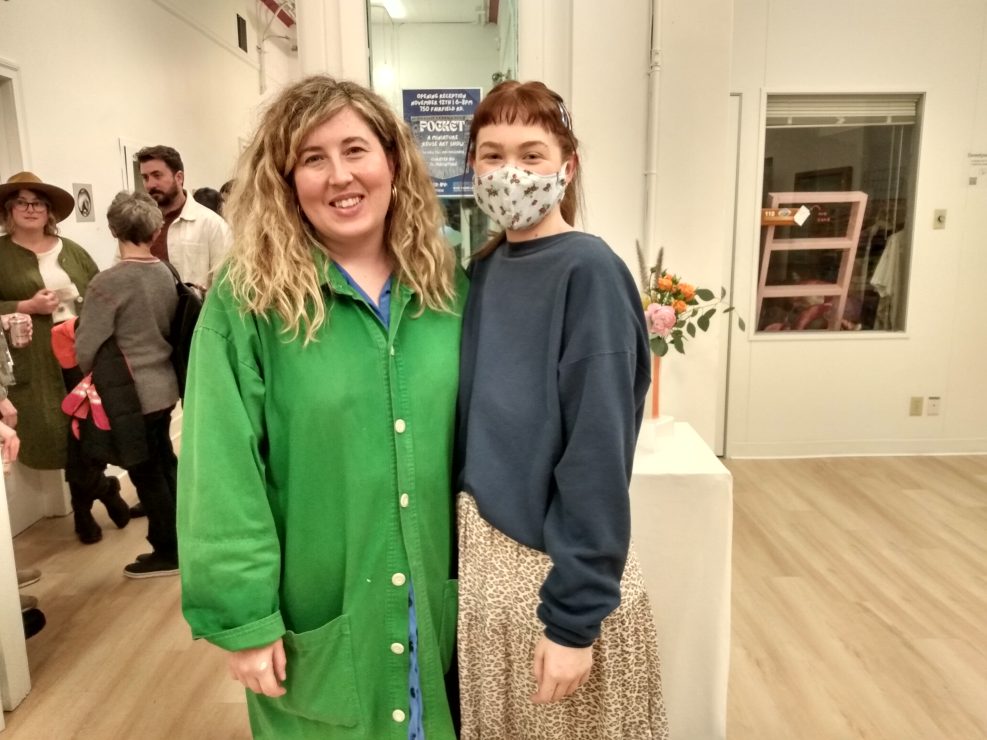Non-profit organization hosts “Pocket: A Miniature Reuse Art Show,” an exhibition of works made from over 70 per cent recycled materials

Artist, curator El MacIntyre and SUPPLY founder and director, Ashley Howe, pose at the opening of POCKET on Nov. 12.
On Saturday, Nov. 12, Pocket, curated by El MacIntyre, held its opening night at SUPPLY, Victoria’s hub for recycled and reused art materials. Billed as “a miniature reuse art show,” each work in the collection is produced from at least 70 per cent recycled, reused, or found media.
During the opening, visitors were greeted with complimentary tea in thrifted cups, and invited to discover dozens of miniature works by over 20 artists.
The works included in the show, which will be running through mid-December, are submissions from artists and members of Victoria’s creative community across every media imaginable. Analog photography from home-made pinhole cameras by Alex Skorochid, woven baskets produced from recycled yarn fiber by Del Rosario, and a mini tableaux of organic materials preserved in resin by visual artist Rose Sleigh are just a few of the creations being showcased.
A tiny sewing room, made by retired resident Linda Chan, sits on a table, collecting together found objects and reused materials that Chan has been gathering for months. It’s a microcosmic world full of materials, buttons, and little furniture inviting viewers to lean in close and investigate.
Ashley Howe, the managing director of SUPPLY, discussed her and MacIntyre’s goals for the show in an interview with the Martlet.
Creative reuse, for Howe, is about showing people how to “breathe new life into old materials through the creative process.” Not only does this show provide space for the submitting artists to be inventive with their media, but according to Howe it also works at inspiring the public to see these materials in a new light.
“We just need to change people’s perceptions around used things and see the educational and creative value in all waste materials,” she said.
SUPPLY, which opened in downtown Victoria in July, serves as a community hub for low and no-cost recycled art, craft, and office supplies. Through running the center, Howe expresses her passion for creating a circular economy — reusing materials — instead of consistently generating unnecessary waste.
As a non-profit organization, SUPPLY’s mission is to divert materials from landfills by putting them in the hands of students, teachers, and communities that need access to them most. This includes a material grant initiative which enables community groups to apply for accessible materials for community-building projects.
Howe first opened SUPPLY as a temporary free store on Vancouver Street, offering those in precarious or houseless living situations access to free creative supplies. Providing art supplies offered meaningful outlets to vulnerable residents. So far, the organization has diverted over 2 000 tonnes of waste from landfills and hopes to divert thousands more in the next few years.
El MacIntyre, curator and practicing artist, first met Howe during one of several visits to the pop-up location on Vancouver Street. As a non-binary, gender-fluid, queer, autistic, and disabled individual, their own creative work explores the intersections of these complex identities. As such, MacIntyre loved SUPPLY’s values of creating a sustainable environment focussed on inclusion and accessibility, and reached out to inquire about volunteering.
Inviting all community members, regardless of experience level or financial status, was a fundamental part of the exhibition.
“Accessibility and inclusion is a big thing for me, as someone who holds multiple diverse identities,” MacIntyre reflected. Expanding on why this is so important, they said, “everyone out there who wants to make art, has something to say.” MacIntyre acknowledged the lack of financial support, materials, and space that can prevent this expression.
This is MacIntyre’s first curatorial project, one which they and Howe envisioned after conversations surrounding miniature works. Each work is no more than eight by eight inches, which helps keep things affordable for the artists. Howe says that small works can be less time-consuming to produce, easier to sell, easier to transport, and less resource-intensive. All of which can reduce barriers to creative production.
Howe believes these values of inclusion can go hand-in-hand with generating positive climate impact.
“Art is such an important way of expressing ourselves and expression is so important. It helps heal ourselves, and then, as healed people, we will be able to heal the planet. It starts with the individual,” Howe said.
SUPPLY is open to the public between 11 a.m. – 6 p.m. Thursday, Friday, and Saturday at 750 Fairfield Road.






